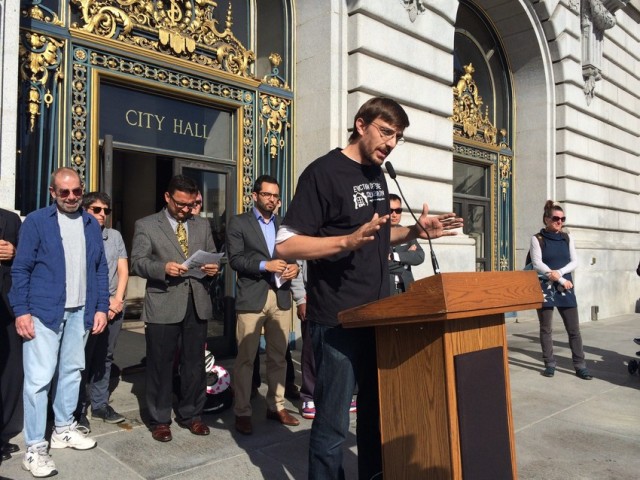The budget analyst's report says there were 3,423 unlawful detainer lawsuits filed in 2013, and 3,695 filed in 2012. Of those, only 17 percent of tenants had legal representation in 2013, and nearly 13 percent had lawyers in 2012.
"I've seen more and more people being evicted from their homes, people becoming homeless and falling into poverty, and one of the reasons is because tenants, for the most part, are unrepresented," said Public Defender Jeff Adachi.
Adachi's office is focused on criminal cases but he joined activists in calling on the Board of Supervisors and Mayor Ed Lee to boost eviction defense funding in the next budget. The activists say attorneys who offer pro bono help are reluctant to take cases to trial. And without the threat of trial, settlements are often watered down. Increased city funding could be used to hire more attorneys to represent tenants.
"My housing was threatened, and if it had not been for legal assistance for the elderly, I would not have my home," said artist and Hayes Valley neighborhood activist Madeline Behrens-Brigham. "I just encourage you to appreciate what attorneys can do for a tenant in trouble."
The last line of defense
For more than two decades, a small nonprofit in San Francisco’s Mid-Market neighborhood, which receives the bulk of the city's eviction defense funding, has been helping poor tenants fight evictions.
Founded by tenant rights activist Miguel Wooding, who died in 2011, the Eviction Defense Collaborative prides itself on providing a pro bono attorney to any tenant sued by a landlord. It also offers rental assistance.
"We do not deny our services to anybody who's being sued for eviction, " said Tyler Macmillan, who started as a staff attorney and became executive director after Wooding's death.
It's a myth that it takes a long time to evict a renter in San Francisco, said Macmillan. The process can actually be very swift.
"It can move as fast as three weeks, from you didn't pay your rent to you are out on the streets," Macmillan said. "States that we consider ourselves akin to have much longer notice periods, much longer procedures."
After that three - or 30-day notice to pay or quit arrives on your door, panic and fear can set in. Many tenants don't know where to turn, and some heed their landlord's orders to leave without putting up a fight, thinking they don't have a choice.
While there has been an uptick in the number of middle-income tenants seeking help at the EDC's small drop-in clinic, the vast majority of clients are low-income residents, or those living 80 percent below the city's median income of $80,000. Many are seniors, people with disabilities and single mothers. This year alone, the collaborative is expected to handle more than 2,000 cases.
Like other nonprofits that assist tenants, the EDC lacks resources to help everyone who walks through its doors. That's why Macmillan, who was at the rally, wants the city to take action to help undo what he calls an unfair legal system.
"We think eviction defense should always be a high priority for San Francisco," Macmillan said. "It's one of the smartest dollars you can spend as a city legislator in terms of what you save on homeless services, emergency services, the costs in hospital visits, or shelter visits."
Hear more about the Eviction Defense Collaborative:
Note: A few years ago, the author received some counseling at the Eviction Defense Collaborative as a tenant.
